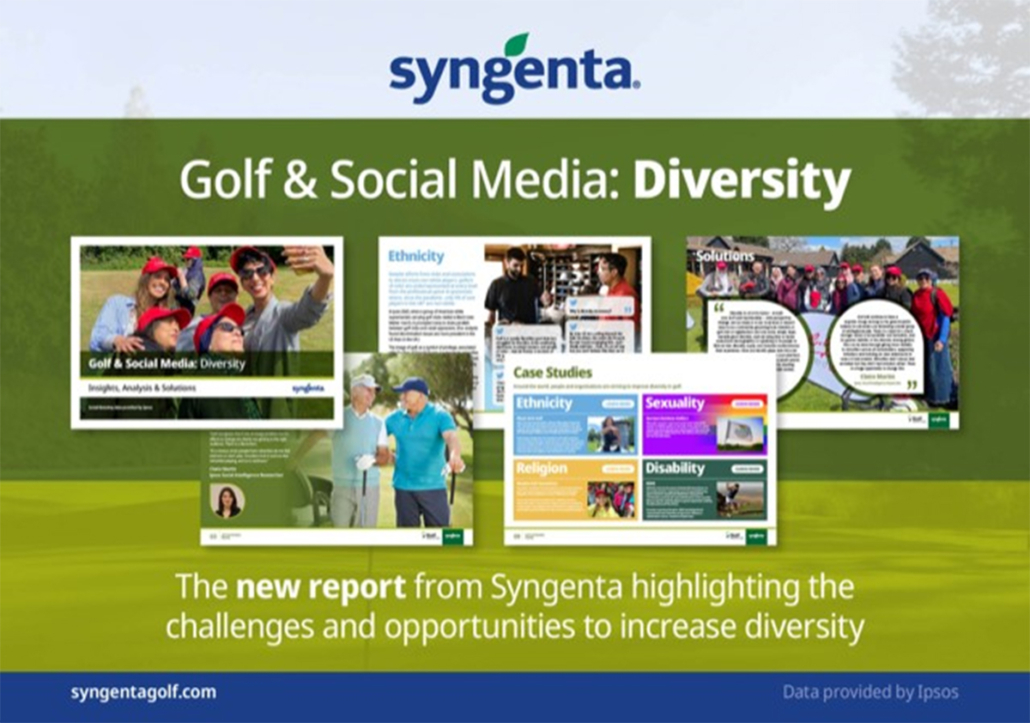Action required to solve golf’s diversity challenge
Action required to solve golf’s diversity challenge: Golf continues to experience unprecedented demand, but it is yet to persuade the public it is a game for all, a new social listening report from Syngenta and Ipsos has found.
Golf & Social Media: Diversity, published today, is part of a landmark study analyzing 16.1 million social media posts, shares, comments and blogs over a three-year period to help businesses understand what is being said about golf online and respond with customer-centric solutions.

Action required to solve golf’s diversity challenge
Despite highlighting successful projects that are making golf more diverse and inclusive, such as Black Girls Golf in the US and the UK-based Muslim Golf Association, the report confirms more work is required to overcome golf’s reputational issues and successfully welcome a wider audience.
Since the pandemic, just 5% of new golfers in the UK are non-white, the R&A’s Post Covid Opportunity Report previously found.
Similarly, in the United States, African American golfers make up just 5% of the country’s 25 million players, yet contribute $4 billion of the total market value.
Claire Martin, Ipsos Social Intelligence Researcher, said: “Golf is aware of its image problem and is trying hard to diversify, but the messages are not always reaching wider audiences and people outside the sport.
“Remarkably, two percent of all mentions in our sample related to Donald Trump and Republicans playing golf. This association does not help dispel the notion that it is a sport for older, white males.”
While the findings underline the challenge golf faces, the report offers solutions and case studies, including Black Girls Golf, founded by Tiffany Mack Fitzgerald, which has built a network of more than 4,000 female players in the United States.
And in a recent podcast interview with Syngenta, Jim Beatty, Executive Editor of African American Golf Digest, said the number of African American golfers could be doubled or tripled, significantly adding to the value of golf and the bottom lines of golf clubs and courses.
Brandon Bell, Syngenta People and Organizational Development Lead, Syngenta North America, offers advice to golf venues looking to build diversity and inclusive into their businesses and making golf welcoming to all: “As a starting point, use local demographic data to better understand the scale of the opportunity to engage with underrepresented groups, then invite these groups to take a survey or join a focus group so you can learn more about their wants and needs – and how you might address those.
“By creating an environment and experience where minority groups feel welcome and valued, and this is reflected in your club imagery and communications, this will help other diverse groups understand that this is a place where they could belong.”
WATCH: Brandon Bell on How to Make Your Golf Club More Diverse
Mark Birchmore Syngenta Global Head of Marketing, Turf and Landscape, who commissioned the report, said: “Golf has long been associated with exclusivity, and this study confirms that it is still widely viewed as a sport for a limited demographic.
“However, there are many examples of golf organisations and businesses making great progress in diversity. Now the sport needs to get better at communicating this progress beyond the industry itself in order to change wider perceptions.”
Data for the report was provided by Ipsos, with 16.1 million mentions of golf on social media in the United States and UK analyzed over a three-year period (2019-2022).
To download this report and all previous Syngenta market studies, visit: www.syngentagolf.com/golf-industry-reports
For the latest industry news visit turfmatters.co.uk/news
Get all of the big headlines, pictures, opinions and videos on stories that matter to you.
Follow us on Twitter and Instagram for fun, fresh and engaging content.
You can also find us on Facebook for more of your must-see news, features, videos and pictures from Turf Matters.









